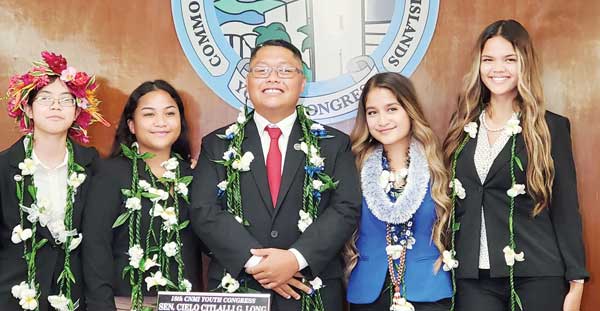Youth takes charge: Youth Congress backs plastic bag ban

Members of the 18th CNMI Youth Congress [from left] youth senators YuriHana Deleon Guerrero Sasamoto, Abriette Patience Taimanao Manglona, Easton Joel Cabrera Dela Cruz, Cielo Citlalli Gutierrez Long, and Liekeila’akata Tapua’ialupe Iakopo. (Ferdie De La Torre)
The CNMI is now only a couple of steps away from becoming plastic-free.
Last Tuesday, the House of Representatives unanimously voted to pass the Eco-Friendly Act of 2021 (House Bill 22-56), introduced by Rep. Sheila Babauta (D-Saipan), which proposes a 10-cent fee for every plastic bag that is issued upon checkout in retail.
It will also lead to an eventual ban, where sellers will no longer be allowed to import, sell, or distribute plastic checkout bags, a year after it becomes law.
This ban on plastic bags is fully supported by the members of the 18th Youth Congress, which passed in June a bill to ban plastic bags on island.
Authored by Youth Congress speaker Cielo Citlalli G. Long, the CNMI Retail Plastic Bag Ban Act of 2021 (Youth Congress Bill 18-3) advances an outright ban on the use of plastic checkout bags in the CNMI once enacted, where all unused plastic bags are to be turned over to the Bureau of Environmental and Coastal Quality.
“Many individuals who reside in the CNMI value the importance of land,” Long told Saipan Tribune in an interview. “Our consumption of single-use plastic destroys land that we cannot afford to give away, so ask yourself this question: Would you give land to your children…or would you rather waste it away due to comfortable usage of non-degradable plastic?”
In a study released by the Department of Public Works on the waste sort composition for April 2019, plastic makes up 16% of the waste generated here on island. This includes plastic bottles, mixed plastics, and bags and film. It ranked third along with other organics (also 16%), next to old corrugated cardboards (33%) and fiber (24%)—all of which, except plastics, decompose fast.
It’s not just land space, Long said. By reducing the use of plastic bags, the community can limit harm being done to oceans and valuable marine life, she added.
“Billions of plastic bags end up as litter each year, and reducing the amount completely within the CNMI brings the population one step closer to improving the environment’s overall welfare. This act manifests but one avenue for a CNMI-wide effort to assist our global neighbors in the reversal of global warming and greenhouse effects that threaten to harm our environment.”
Fast facts from the National Oceanic and Atmospheric Administration stated that the CNMI’s ocean economy employs up to 8,300 people annually, about 40 to 50% of the total local employment, contributing to about $922 million to its annual gross domestic product.
“Like all concerns apparent in the CNMI, its importance depends on how crucial our people believe it to be. The California Plastic Bag Ban reduced plastic bag consumption by 71.5%. With this example of progress, our islands should not have to suffer any longer. There is no doubt that the adverse impacts of plastic bags are undeniable. With that said, I believe its necessity has no timeline,” Long said.
“As the youth, our future is the most at stake, therefore it is important to not only spread awareness but to take action to prevent further harm being done to the environment,” Long added.
Long’s bill states that the Youth Congress recognizes the ongoing threat to marine and terrestrial animals due to discarded non-compostable plastic bags, and with the billions of plastic bags ending up as litter each year, reducing this completely within the CNMI brings us a step closer to improving the environment’s overall welfare.
The CNMI’s youth are definitely taking charge, and we should expect to see more environmental bills from them to come our way, according to Long. “The Youth Congress addresses problems/concerns in all areas. My focus has always been on environmental awareness, so there is no doubt that future bills are in the making. For those who want to express their concerns for the environment, feel free to contact us on any of our platforms, and we will be more than happy to address your needs.”
For more information, and to reach out to the members of the CNMI Youth Congress, email youthcongress@cnmileg.net, or check out their Facebook account (18th CNMI Youth Congress).

























